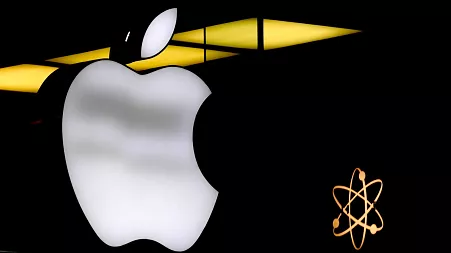Former Italian Prime Minister Mario Draghi's long-awaited report on Europe's competitiveness has finally seen the light of day - and its first lesson for Europe's slowing growth since the turn of the century is to stop procrastinating.
"We have reached the point where, without action, we will have to either compromise our welfare, our environment or our freedom," Draghi warned at the report's launch on Monday.
In his 400-page report, Draghi recommends how to finance and coordinate Europe's policies to avoid being left behind on the global stage.
Euronews gathered his main ideas for Ursula von der Leyen's second Commission to implement if it wanted to avert a "slow agony".
Common debt, the way forward to finance Europe’s needs
Europe needs to mobilise at least €750bn to €800bn a year to keep pace with competitors such as the US and China, according to Draghi's report.
“Delivering this increase would require the EU’s investment share to jump from around 22% of GDP today to around 27%, reversing a multi-decade decline across most large EU economies,” the report reads – stressing the need for common funding along the mobilisation of private investment.
Joint EU borrowing should be regularly used to meet the bloc's ambitions for digital and green transformation, as well as for the much-needed boost to defence capabilities, Draghi said.
"The EU should continue -building on the model of the NGEU [Next Generation funds]- to issue common debt instruments, which would be used to finance joint investment projects that will increase the EU's competitiveness and security," Draghi stressed.
If public goods such as grids and interconnections, defence equipment and defence R&I are not jointly financed and planned, they risk being under-supplied, the report warns.
Europe has a 'China problem’
China comes up repeatedly in Draghi’s analysis – potentially presaging a shift in tone towards Beijing. In recent years, the bloc has seen China as a cooperation partner, an economic competitor and a systemic rival – and now also as a “threat”.
Increased reliance on China could offer a faster and cheaper way to meet Europe's decarbonisation goals, Professor Draghi notes in the report, adding that China's state-backed competition also poses a "threat" to the bloc's clean-tech and automotive industries.
Dutch commissioner-designate Wopke Hoekstra, who is tipped to become the next trade commissioner, made similar comments in a speech to students at Eindhoven University of Technology last week.
"China is challenging us in such a fundamental way that it would be naive to deny that Europe has a China problem," Hoekstra told the audience, stressing that while the bloc was not planning to cut ties with China, it would have to act to redress the balance if competition remained unfair.
Presenting the report on Monday, Draghi specifically recommended that the bloc analyse the situation on a case-by-case basis and act accordingly.
"Trade policy has to be pragmatic, cautious, specific on a case-by-case basis and defensive," the former Italian prime minister told reporters.
Draghi also said the bloc must continue to reduce its economic dependence to increase its internal security, warning that Europe is particularly dependent on a handful of suppliers for critical raw materials and digital technology. In the case of chips, the former ECB president noted that 75-90% of the world's wafer manufacturing capacity is located in Asia.
Keeping Europe's companies in Europe by boosting innovation
Europe must urgently refocus its collective efforts to close the innovation gap with the US and China, particularly in high technology.
"The problem is not that Europe lacks ideas or ambition (...) but that innovation is blocked at the next stage: we are failing to translate innovation into commercialisation," said Draghi.
In the last five decades, no EU company worth more than €100bn has been created from scratch - and 30% of Europe's unicorns [a privately held start-up company valued at more than $1bn] have left the bloc since 2008 because they could not scale up on the continent.
With the world on the brink of an AI revolution, "Europe cannot afford to remain stuck in the "middle technologies and industries" of the last century. We must unleash our innovative potential," the Italian professor added - including investing in people's skills to match these ambitions.
A focus on industry
With many key sectors facing the risk of offshoring, Draghi repeatedly refers to the need for Europe to have an industrial strategy — but bemoans Europe's inability to coordinate around one.
"Industrial strategies today – as seen in the US and China – combine multiple policies," including tax, trade and foreign policy, he said. "Owing to its slow and disaggregated policymaking process, the EU is less able to produce such a response."
A major case study is in cars, a sector in which Europe is struggling.
Opponents often cite the EU's ambitious regulations that would see conventional petrol and diesel vehicles start to be phased out in just over a decade — but domestic manufacturers factories are also struggling to compete with heavily subsidised Chinese electric cars.
"A comprehensive approach is needed covering all stages" of car production, from research and mining to data, manufacturing and recycling, Draghi says.
The EU must avoid the "pitfalls of protectionism", and shouldn't impose tariffs systematically — but state-sponsored competition costs European jobs, he added.
Europe’s decision-making needs to be reformed
Cutting red tape and making the bloc's decision-making rules more efficient will allow it to act more quickly, the report said.
"Europe does not coordinate where it matters, [and] Europe's decision-making rules have not substantially evolved as the EU has enlarged and the global environment we face has become more hostile and complex," Draghi said.
The Italian is proposing urgent action - and one of Europe's stumbling blocks is its complex and slow policy-making process, which takes an average of 19 months to agree new laws and is subject to multiple vetoes along the way.
As of 2019, the EU has passed around 13,000 pieces of legislation, while the US has passed 3,000 and 2,000 resolutions, Draghi pointed out at the press conference: "That [fact] makes you think, can we do a little less and can we be a little more focused?"
Will it happen?
Draghi's findings, drafted with the aid of Commission officials, have gained significant attention — but their long-term impact is unclear.
Europe is undoubtedly facing up to a series of crises — continued economic slippage, environmental transition and war.
But Draghi's proposals — financing bigger EU spending, consolidating capital markets, and removing national vetoes — are longstanding Brussels demands that have been repeatedly opposed by the EU's own members.
It's hard to see that changing, as many EU governments are facing up to the rising threat of the far right; leaders in France and Germany in particular, the traditional motors of EU integration, have been weakened by recent election results.
Von der Leyen's hope will be that she can change that, by putting the issue at the centre of her political mandate.
Disclaimer: The copyright of this article belongs to the original author. Reposting this article is solely for the purpose of information dissemination and does not constitute any investment advice. If there is any infringement, please contact us immediately. We will make corrections or deletions as necessary. Thank you.



